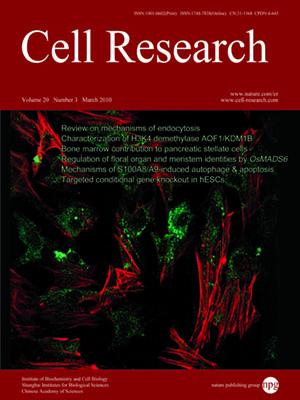
Volume 20, No 3, Mar 2010
ISSN: 1001-0602
EISSN: 1748-7838 2018
impact factor 17.848*
(Clarivate Analytics, 2019)
Volume 20 Issue 3, March 2010: 332-344
ORIGINAL ARTICLES
Wwp2 mediates Oct4 ubiquitination and its own auto-ubiquitination in a dosage-dependent manner
Bing Liao1,2,4 and Ying Jin1,2,3
1Key Laboratory of Stem Cell Biology, Institute of Health Sciences, Shanghai Institutes for Biological Sciences, Chinese Academy of Sciences/Shanghai Jiao Tong University School of Medicine; 225 South Chongqing Road, Shanghai 200025, China
2Shanghai Stem Cell Institute, Shanghai Jiao Tong University School of Medicine, Shanghai 200025, China
3Key Laboratory of Cell Differentiation and Apoptosis of Chinese Ministry of Education, Shanghai Jiao Tong University School of Medicine, Shanghai 200025, China
4Graduate School of Chinese Academy of Sciences, Beijing 100000, China
Correspondence: Ying Jin,(yjin@sibs.ac.cn)
Transcription factor Oct4 plays critical roles in maintaining pluripotency and controlling lineage commitment of embryonic stem cells (ESCs). Our previous study indicates that Wwp2, a mouse HECT-type E3 ubiquitin ligase, ubiquitinates Oct4 and promotes its degradation in a heterologous system. However, roles of Wwp2 in regulating endogenous Oct4 protein levels as well as molecular characteristics of the function of Wwp2 have not been determined. Here, we report that Wwp2 plays an important role in Oct4 ubiquitination and degradation during differentiation of embryonal carcinoma cells (ECCs), although it does not appear to affect Oct4 protein levels in the undifferentiated ECCs and ESCs. Importantly, inhibition of Wwp2 expression by specific RNA interference elevates the Oct4 protein level, leading to attenuation in retinoid acid-induced activation of differentiation-related marker genes. Mechanistically, Wwp2 catalyzes Oct4 poly-ubiquitination via the lysine 63 linkage in a dosage-dependent manner. Interestingly, Wwp2 also regulates its own ligase activity in a similar manner. Moreover, auto-ubiquitination of Wwp2 occurs through an intra-molecular mechanism. Taken together, these results demonstrate a crucial role of Wwp2 in controlling endogenous Oct4 protein levels during differentiation processes of ECCs and suggest an interesting dosage-dependent mechanism for regulating the catalytic activity of the E3 ubiquitin ligase, Wwp2.
Cell Research (2010) 20:332-344. doi: 10.1038/cr.2009.136; published online 8 December 2009
FULL TEXT | PDF
Browse 2321


